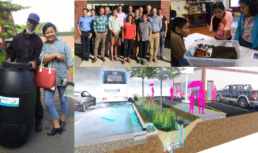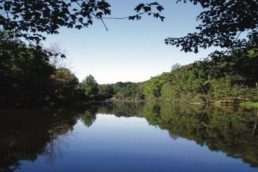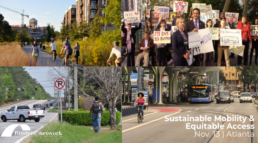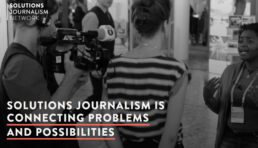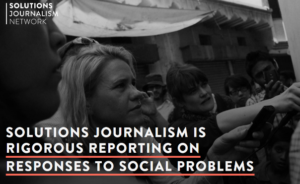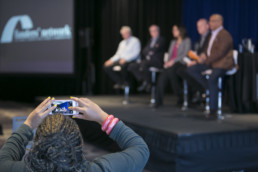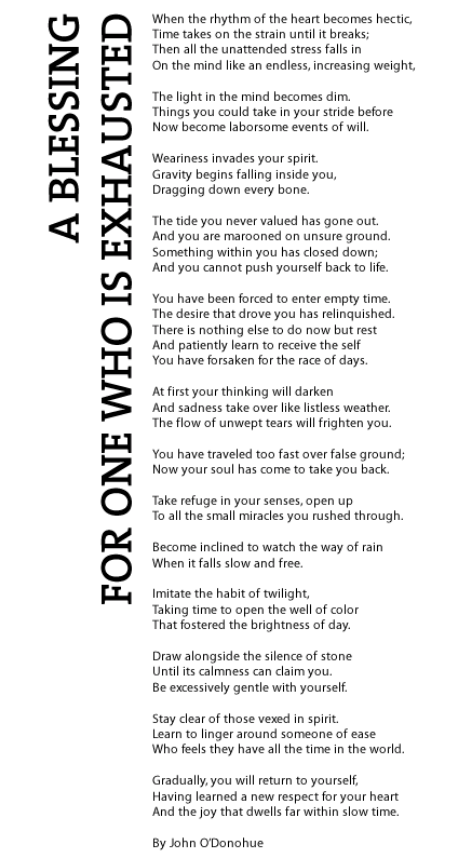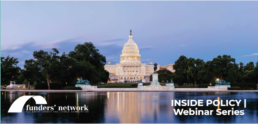Sustainable solutions at the local level: Meet the newest Partners for Places grantees!
By Ann Fowler Wallace, TFN Director of ProgramsWe're excited to announce the latest grantees of the Partners for Places matching grant program: Six communities across the U.S. will receive more than a million dollars to fund sustainability efforts that will help them better withstand the impact of climate change, prepare for natural disasters and engage local voices in planning and decision-making. These sustainability efforts will take place in communities both large and small, from a project to create resiliency hubs that would serve the residents of New Bedford, Mass., in the wake of hazardous weather, to a plan to create a greener, more pedestrian-friendly thoroughfare in a bustling and culturally diverse neighborhood in Denver, Colo. The funding is made possible through the Partners for Places matching grant program, led by the Funders’ Network for Smart Growth and Livable Communities (TFN) in partnership with the Urban Sustainability Directors Network. Partners for Places pairs local governments with philanthropy to support sustainability projects that promote a healthy environment, a strong economy, and well-being for all residents. |
|
Two of the projects build on important earlier efforts funded by the Partners for Places matching grant program: an ambitious project in Portland, Ore., to ensure that efforts to reduce greenhouse gas emissions and create a community-led energy plan directly benefit low-income residents, and efforts in Hartford, Conn., to address flooding and stormwater challenges while ensuring those efforts act as a catalyst for improved social equity, public health, and economic development. |
|
Both cities are prior recipients of Partners for Places grants, and reflect one of the matching grant program’s priorities: projects that empower and engage low-income neighborhoods — communities that are disproportionately affected by climate change and extreme weather. “Whether it's preparing for natural disasters or trying to predict the fallout from other environmental hazards, communities are on the front lines of climate change," said Darryl Young, director of Sustainable Cities at the Summit Foundation and who serves as secretary of TFN's Board of Directors. "More and more, city mayors and other local leaders are stepping up, speaking out, and showing that they are going to act proactively to ensure their communities not only survive but thrive in this changing world.” |
In Bend, Ore., Partners for Places will renew funding for ongoing efforts to create a climate action plan, including efforts to educate the community about the risks posed by climate change and identify actions that can transition Bend to a low-carbon future. Meanwhile, the grant program will support efforts in the city and county of Sarasota, Fla., to help local non-profits become more energy efficient — helping Sarasota achieve its sustainability goals while allowing local environmental and human-service organizations to reduce costs and focus their limited resources on their core missions. |
Partners for Places will provide $507,459 in funding to these six cities through its general grant program, which will be matched by local funders. That means a total of $1,014,918 will be leveraged to fund sustainability projects in these selected cities. The general grant program is supported by seven investor foundations: The JPB Foundation, The Kendeda Fund, The Kresge Foundation, The New York Community Trust, the Pisces Foundation, The Summit Foundation, and the Surdna Foundation. This grant cycle includes $139,959 awarded to two green stormwater infrastructure projects — in the cities of Denver and Hartford — designed to advance water-related sustainability goals, made possible by the support of the JPB Foundation, Kresge Foundation and the Pisces Foundation. “These projects demonstrate how innovation, partnership and investment at the local level can truly drive change,” said Dr. Jalonne L. White-Newsome, a senior program officer with The Kresge Foundation’s Environment Program and who oversees the foundation’s Climate Resilience and Equitable Water Systems (CREWS) initiative. “They will improve water management, climate resilience, water quality and help create communities that are healthier, safer and more desirable places to live.” |
The latest Partners for Places grant recipients and their matching funders are:Bend, Ore. ($42,500): To continue the city’s ongoing work to create a community climate action plan, convening diverse voices in the community – such as businesses, civic equity leaders, local youth and neighborhood residents – to collaborate with government agencies, environmental groups and subject-matter experts to identify strategies and build support for the plan. (Matching funder: The Oregon Community Foundation Donor Advised Funds.) Denver, Colo. ($74,959): To strengthen the impact of a green infrastructure along a major thoroughfare in the Little Saigon business district that improves stormwater management and air quality while providing a safer, more enjoyable experience for residents walking or using public transit – especially those who can’t drive because of age, income, or a disability. (Matching funder: Colorado Health Foundation.) Hartford, Conn. ($65,000): To support green infrastructure efforts that will improve localized flooding and stormwater management and create a more resilient city, including developing design specifications and scaling a program that encourages residents to redirect water from gutter downspouts to help alleviate sewer overflows, basement flooding, high water bills and other issues. (Matching funder: Hartford Foundation for Public Giving.) New Bedford, Mass. ($25,000): To create a resilience hub and community alert system pilot project, working with environmental/social justice partner organizations to identify locations within the City’s Gomes Neighborhood and the Near North End Neighborhood to build on existing community ties, create new relationships with underserved communities, and bolster community resilience. (Matching funder: Island Foundation.) Portland, Ore. ($150,000): To implement a community energy plan in the Cully neighborhood through community-led investments that address both environmental needs as well as economic and social disparities, ensuring efforts directly benefit low-income residents. (Matching funder: Meyer Memorial Trust.) Sarasota, Fla. ($150,000): To empower and encourage local non-profits to improve energy efficiency, allowing them to focus limited resources on their core missions while furthering both the city and county of Sarasota’s sustainability goals. (Matching funders: Gulf Coast Community Foundation and the Charles and Margery Barancik Foundation.) To date, Partners for Places has awarded more than $7 million across North America in this successful matching grant program, leading to over $14 million in investments. Partners for Places will open a new round of funding for the general grant program in early summer. The Round 14 RFP will be released on Dec. 5, 2018, and proposals will be due on Jan. 31, 2019. Want to learn more about the next round of Partners for Places grants? We're hosting a Round 14 Info Webinar at 2 p.m. ET Dec. 11. Register here. For more information or media requests, please contact Communications Director Tere Figueras Negrete at tere@www.fundersnetwork.org. |
 |
The Power of Collaboration for Clean Water
By Andrew Johnson, Watershed Protection Program Director, William Penn Foundation
The Delaware River Basin supplies drinking water to over 15 million people throughout the mid-Atlantic, and is the lifeblood of the region’s cities, suburbs, forests, and farms. Today, in spite of an impressive recovery over the past four decades (thanks largely to the Clean Water Act) the watershed is at risk of “death by a thousand cuts” due to severe fragmentation of local land use decisions, farming practices and stormwater management. These thousand cuts, in the long term, jeopardize clean water for five percent of the US population. These challenges are not headline-grabbing crises. Rather they are incremental, cumulative and deeply embedded in local land use policies.
How can a regional funder effectively catalyze change in such a complex system? No doubt many TFN members grapple with this question in your work for livable and healthy communities. This question is rich for us, especially today as the federal government is increasingly less likely to take the lead on driving change at the regional scale, even as a rapidly changing climate hits our communities harder every year.
Six years ago, we reworked our environmental grantmaking to focus on the protection and restoration of clean water in the Delaware River watershed. As part of that shift, we developed the Delaware River Watershed Initiative (DRWI). Today, five years and more than $100 million in DRWI investments later, we have learnings, both inspiring and humbling, to share as the next three-year phase of this program begins.
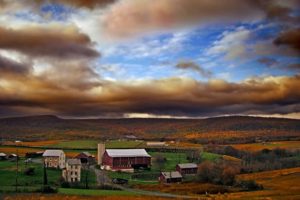
When we got started, there were dozens of nonprofit organizations working across the basin to reduce stormwater pollution, protect forests, bring back native plants, and support river-friendly farms. But, absent a shared plan of action and with little coordination, as a community we were missing opportunities to leverage and build upon each other’s successes to meaningfully improve water quality. And, because of this fragmentation, it was nearly impossible to standardize water quality metrics—key to understanding progress over time.
We began by tapping the expertise of the Academy of Natural Sciences of Drexel University and the Open Space Institute to use data to identify the most promising places where, with our funding, we could tip the scale in favor of clean water. Next, we engaged more than 40 conservation nonprofits who work on the ground and provided them with support to develop shared action plans, in teams, to focus their efforts in those places and on a list of four key threats to clean water. Finally, we set up measurement sites in the same places so we could assess impact effectively.
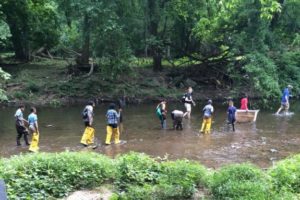 Our goal was to focus and amplify the excellent land protection and restoration work already underway across the basin, by using our grantmaking and convening powers to encourage collaboration and alignment.
Our goal was to focus and amplify the excellent land protection and restoration work already underway across the basin, by using our grantmaking and convening powers to encourage collaboration and alignment.
Five key components of the initiative are worth sharing, because they seem to be working well as we launch the second phase of this work:
1. Grantee Collaboration: The Initiative was conceived and is run as a collaborative among more than 40 grantees working in teams in eight parts of the watershed. This is both challenging and rewarding, and we’re achieving aligned impact in carefully selected places that serve as laboratories for change and models for expansion.
2. The Power of Intermediaries: Facilitating collaboration across more than 40 nonprofit partners is a huge job and requires significant expertise and ongoing attention. We have invested in the very skilled Institute for Conservation Leadership to develop, nurture and steward the DRWI network.
3. Embedding Science: We are using active monitoring and modeling to ensure that scarce dollars are spent in the most efficient and effective ways. This is often a culture-shift for small organizations that don’t have science-based capacity or culture. We partner with the Academy of Natural Sciences at Drexel University as the science lead for DRWI, and also engaged Stroud Water Research Center—both of which provide essential technical assistance.
4. Funder Coordination: Our collaborative approach has helped unlock other funding streams from local, state and federal sources for core project work on the ground, as we have been able to demonstrate “transformative” partnerships that go beyond “transactional” partnerships. Partnering with the Open Space Institute and National Fish and Wildlife Foundation to manage re-grant programs focused on land protection and restoration, respectively, enables us to leverage the expertise of these key partners to direct funds to projects that will produce the greatest return on investment.
5. Storytelling: Communications is a key pillar of this Initiative. It’s important to leverage grantees’ ability to tell nuanced, local, powerful stories about the positive impact of land use decisions on water quality. Strong storytelling grows support, which will allow us to scale up this approach across the watershed.
As the second phase of the work begins, we face three key challenges that are also worth sharing:
- Social equity considerations were not baked into the formation of the DRWI, despite our recognition that clean water is particularly important to vulnerable downstream communities who pay the price for upstream pollution. As we focus in on the equity dimensions of our work, we face challenges connecting these dots.
- An external evaluation of the DRWI reinforced the need for clear, measurable goals. While we can’t reasonably claim that our funding will protect water quality in the entire basin, we are now refocused on demonstrating impact within our key focus areas. This change—from the rhetorical to the achievable—is making a difference as the initiative evolves.
- While science-based decision-making is critical, it is not always enough. Grantees need the freedom to work on policy change that shifts the rules in favor of clean water actions at the local and state levels. This is particularly true as the Trump administration rolls back clean water protections, and local ordinances and state regulations become ever more important.
We are already thinking about where we want the Initiative to be at the end of 2021, and how over the next two years we can meaningfully evolve DRWI from a William Penn Foundation funding strategy to a sustainable regional initiative. To help us navigate this evolution, we’d love to hear from other TFN members about experiences you’ve had with regional initiatives. Feel free to reach out to me at ajohnson@williampennfoundation.org .
More information about the Delaware River Watershed Initiative can be found here.
About the Author
 Andrew Johnson manages the William Penn Foundation's Watershed Protection program, which focuses on protecting and restoring water quality in the Delaware River watershed. He oversees a team organized around three related strategies: research, data collection, monitoring and advocacy with watershed-wide implications; on-the-ground restoration and preservation work and monitoring in specific subwatersheds in the Delaware River basin; and building the constituency for watershed protection by engaging people involved in outdoor activities on the Circuit, Greater Philadelphia’s 750-mile regional trail network
Andrew Johnson manages the William Penn Foundation's Watershed Protection program, which focuses on protecting and restoring water quality in the Delaware River watershed. He oversees a team organized around three related strategies: research, data collection, monitoring and advocacy with watershed-wide implications; on-the-ground restoration and preservation work and monitoring in specific subwatersheds in the Delaware River basin; and building the constituency for watershed protection by engaging people involved in outdoor activities on the Circuit, Greater Philadelphia’s 750-mile regional trail network
Hurricane Florence: What's Next? | Webinar & Funder Resources
By Martha Cecilia Ovadia, Senior Program Associate, Equity & CommunicationsHurricane Florence will have wide-reaching impacts that require strategic, long-term investments across parts of the Southeast and Mid-Atlantic. Although the storm has been downgraded, Florence still poses a significant threat to lives and property, according to the National Weather Service Join the Center for Disaster Philanthropy's upcoming webinar to learn more. Hurricane Florence: What’s Next? Tuesday, Sept. 18 3 p.m. ET/ 2 p.m. CT. CDP is also launching its 2018 Atlantic Hurricane Season Recovery Fund; details about this fund will be provided during the webinar. This webinar is co-sponsored by the Funders' Network, the Environmental Grantmakers Association, Southeastern Council of Foundations, and the Council on Foundations, with funding from the UPS Foundation. |
Additional ResourcesAs people across North America grapple with the realities of climate change and extreme weather events, the Funders' Network is committed to providing funders with the opportunity to learn and share strategies that address these issues and help communities become more resilient and equitable in their disaster preparations and recoveries. Here are additional events and resources from CDP, which serves as the technical assistance and curriculum partner for TFN's Philanthropic Preparedness, Resiliency and Emergency Partnership (PPREP): Webinar | Hurricanes Irma and Maria: State of Recovery Blog | Strategies for Funding the 2018 Hurricane Season Data | Measuring the State of Disaster Philanthropy: Data to Drive Decisions For more resources and updates, visit the Center for Disaster Philanthropy's website. |
Let's get moving: Join our Funder Roundtable on sustainable mobility and equitable access
By TFN Staff
Anyone who slogs through an endless commute, worries about how their kids can get safely to school or struggles to find reliable transportation will agree: We need to do a better job of connecting people to where they need to be and want to go.
Providing safe, convenient, attractive and affordable options is complex work that intersects many priorities: climate, equity, health, housing and economic development, to name just a handful.
If you're interested in learning more about strategies and collaborations, join us in Atlanta on Nov. 13 for TFN's Funder Roundtable: Sustainable Mobility and Equitable Access.
A group of funders active in this area will discuss shared strategies and the value of a funder learning community. Participants will explore possible collaborations and plan next steps.
This will be a dynamic interactive session with actionable outcomes. We welcome interested funders.
For more information, please contact Martha Roskowski at martha@furtherstrategies.com or Ann Fowler Wallace at ann@www.fundersnetwork.org.
The meeting takes place from 8:30 a.m.- 4:30 p.m. at Southface Energy Institute, followed by a reception and dinner with TFN’s GREEN working group. The GREEN working group will be holding its annual meeting at Southface Energy Insititute Nov. 14-15. Click here for more information.
This Funder Roundtable is sponsored by TFN in partnership with:
Mary Skelton Roberts, Barr Foundation
Neelima Shah, Bullitt Foundation
John Mitterholzer, The George Gund Foundation
Elizabeth Love, Houston Endowment
Darryl Young, The Summit Foundation
David Bragdon, TransitCenter
Explore sustainability strategies at TFN's GREEN Annual Meeting in Atlanta
By TFN Staff
Atlanta has emerged as a leader among southern states in its commitment to clean energy and sustainability – including an ambitious 100 percent renewable energy commitment by 2050.
TFN's GREEN 2018 Annual Meeting Network takes place Nov. 14-15 in this dynamic and fast-growing city, giving funders a chance to network with their peers, explore sustainability strategies and learn how the Southeast is facing its climate, energy, and water resource challenges. Be sure to register today!
Agenda Highlights
Our agenda is designed to offer funders the opportunity to:
• Explore the important role the philanthropic community plays in advancing sustainability, climate mitigation, urban resilience, and integrated approaches to energy and water management;
• Learn firsthand how the Southeast is facing its climate, energy, and water resource challenges in a region with both progressive city leadership but more conservative state complexions;
• Hear from regional and metropolitan Atlanta environment, climate, and equity advocates working to protect one of the most ecologically and culturally vibrant places in the United States;
• Connect with and learn from fellow TFN members and others working in the philanthropic sector.
Wednesday morning will include presentations from Southeast-based philanthropic colleagues who will share their individual and collective strategies for advancing equitable climate, water resource and land use solutions. On Wednesday afternoon, funders will head out on a site visit to see the Atlanta Beltline, West Side, and adjacent neighborhoods that are incorporating green infrastructure, parks, the arts, and affordable housing into efforts to revitalize and equitably redevelop this area. The meeting will conclude on Thursday afternoon following funder strategy discussions and a deep-dive session on the City of Atlanta's aggressive clean energy strategy, which will include a demo of some of the tools used to inform that work.
The GREEN meeting will be preceded by a one-day funder roundtable on sustainable mobility and equitable access on Tuesday, Nov. 13. Funders attending the GREEN meeting are invited to attend the funder roundtable. Stay tuned for more information on the funder roundtable, as well as updates on 2018 GREEN Annual Meeting speakers and sessions!
Agenda Overview
Tuesday, November 13
• 8:30 a.m. – 4:30 p.m. Sustainable Mobility & Equitable Access Meeting, Southface Energy Institute
• 6:30 – 8:30 p.m. Joint Reception & Dinner w/ Mobility & GREEN Funders
Wednesday, November 14
• 8:30 a.m. Breakfast Available in Meeting Room
• 9:00 a.m. – 2:00 p.m. Half-Day Meeting, Southface Energy Institute
• 2:15 – 5:00 p.m. Atlanta Site Visit
• 6:30 – 8:30 p.m. GREEN Reception & Dinner
Thursday, November 15
• 8:30 a.m. Breakfast Available in Meeting Room
• 9:00 a.m. – 2:00 p.m. Half-Day Meeting, Southface Energy Institute
Lodging
Please contact Ashley Quintana at ashley@www.fundersnetwork.org if you are having problems making a reservation. Who Should AttendRegistration is open to donors, staff, directors, and trustees of all grantmaking institutions. We are seeking to create a small and intimate gathering of funders with the goal of learning, sharing and facilitating strategic conversations about where philanthropic resources can have the greatest impact. |
RegistrationClick here to register. There is a modest registration fee of $250 to participate in this meeting for funders who are not members of the Funders’ Network. For questions or further information, please contact Ashley Quintana at ashley@www.fundersnetwork.org or 305-667-6350 ex. 201. |
Planning CommitteeThank you to our funder planning committee for their ideas, guidance, and assistance in planning this meeting: • Jessica Boehland, The Kresge Foundation About GREENThe GREEN funder working group was created in 2005 by funders interested in better understanding the promise that green strategies hold for improving outcomes for people and place. The working group is currently focused on learning more about green issues, identifying leverage points, and facilitating strategic collaborations in three specific arenas: Climate mitigation and adaptation, sustainability practices in cities and regions, and neighborhood/district sustainability. The GREEN funder advisory committee is co-chaired by Jessica Boehland of The Kresge Foundation and Mariella Puerto of the Barr Foundation.
|
|
|
Beyond the headlines: The power of solutions journalism
By Martha Cecilia Ovadia, Senior Program Associate, Equity and Communications
The Intermountain West Funder Network recently convened in Santa Fe, N.M. for its annual meeting. This year’s event focused on forward-looking strategies that would help funders increase the impact of their grantmaking to create more resilient, sustainable and equitable communities in the Intermountain West region. The meeting focused on exploring Santa Fe to learn first-hand about sustainable development issues in and around the city, learning about the protection of diverse cultural heritages and sacred places in New Mexico and learning from local strategies about how to foster land and water resilience and encourage food justice in the region.
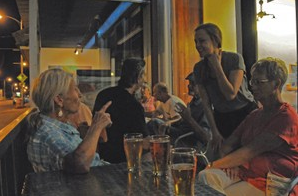
Another area of focus: The importance of journalism and the powerful role philanthropy can play in ensuring local storytelling and investigative reporting remain robust — especially in underserved “media deserts.”
Leah Todd, the Mountain West manager for newsrooms at Solutions Journalism Network, was the keynote speaker at the opening night reception in Santa Fe, sharing insight on effective communications and storytelling through the lens of solutions journalism in the region. Since 2016, Solutions Journalism Network has collaborated with 140 news organizations on solutions-oriented projects. One of those projects included State of Change, a year-long investigation with a group of New Mexico news organizations that looked at the challenges to building resilient rural communities, and found a lack of high-speed internet holds communities back. It was just one example of the type of issues brought to light during this project. The reporters not only looked at the barriers to launching internet connections in rural areas, but also highlighted tribes, towns and schools whose efforts were successful. The New Mexico project was led by the Solutions Journalism Network in partnership with High Country News, and with funding from the LOR Foundation — a supporter of the Intermountain West Funders Network and a TFN member. (Other TFN members that support Solutions Journalism Network include the Ford Foundation, the Knight Foundation, the Robert Wood Johnson Foundation, The Rockefeller Foundation, The Annie E. Casey Foundation and the Walton Family Foundation.)

Below are five key takeaways from her presentation, which can be found in its entirety here.
- What is solutions journalism?
Solutions journalism is rigorous, evidence-based reporting on responses to social problems. This form of journalism explains in meaningful detail what worked in a situation, but also looks for limitations and unintended consequences.
- How can we identify solutions journalism imposters?
Always look for overpromising and generalizations. When you see a headline that promises a perfect solution—walk away! Solutions journalism knows that there are no perfect solutions and good solutions journalism takes the time to point out any limitations of a response and to also point the readers in the direction of effective change happening right now.
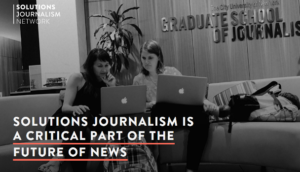 For effective solutions journalism, Todd encourages journalists to apply these shifts to re-focus their writing:
For effective solutions journalism, Todd encourages journalists to apply these shifts to re-focus their writing:
- Instead of hero worship: focus on systemic change
When writing about someone doing good and making a difference, the focus of the story can sometimes become the individual, taking away from delving deeper into whatever initiative or response they are furthering. While stories that focus on individual successes (or failures) have their place in journalism, solutions journalism works through a broader, more solutions focused lens.
- Instead of a silver bullet: tone down the rhetoric and show downsides too
Keep an eye out for journalistic pieces that overclaim. You will usually see words like “lifesaver” and “breakthrough” attached to this type of writing. Instead, look for pieces that take the time to tell the narrative of what is working, what is not working, and that looks to other communities to find potential parallels in place-based work that could be applied locally.
- Instead of a think piece: show what is working now
This refers to journalism that proposes things that do not exist yet. Solutions journalism speaks to what is happening now, not predictions or recommendations for the future.
- Instead of an afterthought: weave solutions throughout the story
Solutions should be an integral part of the storytelling—not an afterthought at the end of a story. Solutions must be considered seriously and presented with care. This challenges us to embrace the possibilities at hand
- What is solutions journalism’s “Theory of Change”?
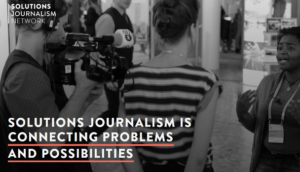 Journalists must act as responsible and informed whistleblowers and work to expose wrongdoing. By pointing out social problems, journalist can help in spurring reform and highlighting solutions. But this is not all that should be done. Journalist must also cover information on how to respond to those problems, offering examples and narratives needed for self-correction.
Journalists must act as responsible and informed whistleblowers and work to expose wrongdoing. By pointing out social problems, journalist can help in spurring reform and highlighting solutions. But this is not all that should be done. Journalist must also cover information on how to respond to those problems, offering examples and narratives needed for self-correction.
- How does solutions journalism increase accountability?
With responsible journalism that focuses on solutions, problems that were once seen as unavoidable become problems that are seen as unacceptable. The ability to view a problem as unacceptable comes from journalism that presents solutions and deconstructs the cultural narrative of “this is how it has always been.”
- Can solutions journalism also function as a form of societal and self-care?
News fatigue has created a sense of learned helplessness in those consuming the news. When negative reporting is played over and over and over again, it creates a desire to tune out. However, evidence suggests that when people think something can be done about a problem, they are more receptive and attentive to the information. And while negative messages spread faster than positive ones, positive messaging focusing on solutions reach larger audiences. Solutions journalism is a healthier, more effective approach to journalism.
Additional Resources:
- The Solutions Journalism Network’s Solutions Story Tracker lets you search for stories by geography, topic area and success factors, among other categories.
- Check out two case studies presented during the Intermountain West Funders Network annual meeting for a look at solutions journalism in action:
- State of Change: Building Resilience in New Mexico
- The Montana Gap
- Listen to How Investing in Media Can Drive Positive Community Change, a TFN webinar featuring LaMonte Guillory of the LOR Foundation, Keith H. Hammonds of Solutions Journalism Network, Kate Schimel of High Country News and Johs Stearns of the Democracy Fund.
- For more information on the Intermountain West Funders Network working group, click here or contact Amy Swiatek at amy@www.fundersnetwork.org.
About the Author
 Martha Cecilia Ovadia is TFN's senior program associate for equity and communications. Contact her at marci@www.fundersnetwork.org.
Martha Cecilia Ovadia is TFN's senior program associate for equity and communications. Contact her at marci@www.fundersnetwork.org.
Do you have a great strategy or story to share? Submit a session proposal for #TFNMiami
ByTFN Staff
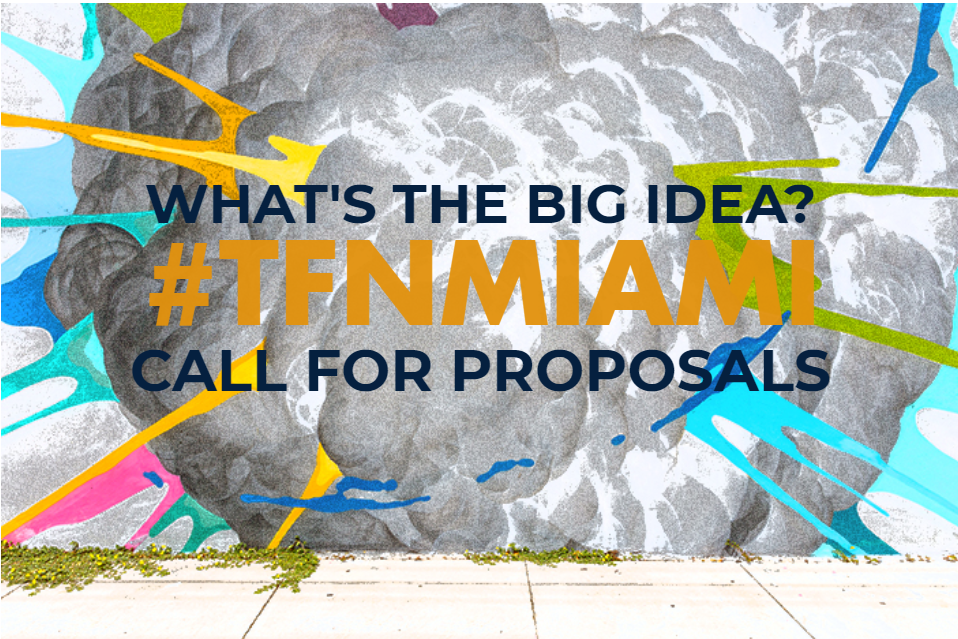 The Funders’ Network (TFN) 2019 Annual Conference marks the network’s 20th anniversary. We’ll be coming back to Miami, the site of TFN’s first annual conference, providing the perfect opportunity to reflect on the past, explore the present and look forward to the future.
The Funders’ Network (TFN) 2019 Annual Conference marks the network’s 20th anniversary. We’ll be coming back to Miami, the site of TFN’s first annual conference, providing the perfect opportunity to reflect on the past, explore the present and look forward to the future.
We’re looking for dynamic, interesting and informative proposals for sessions and speakers, particularly those that advance TFN’s goals of creating communities that are equitable, environmentally sustainable and economically prosperous.
How are communities grappling with climate change, natural disasters and other environmental threats? Addressing social, racial and economic injustices? Fostering opportunities for success and well-being for all, not just some?
About #TFNMiami
I need a minute — and you probably do, too: Why champions for justice need to practice self care
By Bina M. Patel, TFN PLACES Coach & Facilitator
Resiliency, Justice, and Equity (& a blessing 'For One Who is Exhausted')
I have been on the road almost every week for the last 6 months. My time is full of facilitating and coaching people looking to advance the collective good through racial and gender equity, building community power, and strategizing about redesigning the status quo. Together we tackle deeply intimate, personal, organizational, and fraught issues. Sometimes, as much as they intend to advance, they resist. My work is to support breaking through the noise, anger, othering, and dehumanizing to reach the other side - love.
Honestly, I am exhausted. I am grateful to be of service, and also acknowledge that this is often heartbreaking, defeating and soul challenging work. Then add personal life things, TSA screenings, late flights, and time zone chaos. You can imagine. I am tired in all the ways.
I often get asked: How do you do it? How do you hold that space? Facilitate this really hard stuff with so much calmness? How do you do this every day?
A few thoughts, and a blessing from John O'Donahue to my fellow champions of justice and peace.
1. Know your purpose. I am deeply rooted in my purpose to the collective good and draw on that every day in order to be of service and keep on doing the work. Reflection: What am I called to do in service of the collective good? What do I need to let go of to so? Then, start letting go.
2. Set an intention. I set an intention for how I will show up for each session, workshop, meeting, and even flights. Peace, grace, love, compassion. Reflection: what will make me proud of my leadership today? What can I give to the betterment of this space, this community, this organization? Then, practice making it real and observable.
3. Sleep and recharge. Honestly acknowledge when you are tired, heartbroken, and need a break. Then, follow through. Why? We need you. Our collective betterment needs each of us to come back tomorrow, and the next day, and again. That is resiliency. Invest in the space that helps you heal, so that your servant leadership can be realized in its fullest. Nature, body movement, sleep, quiet and reflection, music, art - all and any of the things that allow you to continue on your purpose-full path. Reflection: What do I need to come back tomorrow? Then, take steps to design that experience.
Lastly, here is that blessing I mentioned from John O'Donahue, For One Who Is Exhausted:
In peace and service.
About the Author
Next up in 'Inside Policy': Can Opportunity Zones create equitable impact?
By TFN StaffKeeping abreast of federal policy can be daunting — especially given the daily churn of a 24/7 news cycle and rapidly shifting Washington landscape. Join us for the second installment of our Inside Policy briefings that explore emerging policy trends and their potential impacts on people and communities. Register for our next Inside Policy briefing, Can Opportunity Zones Create Equitable Impact?, July 23 from 3 to 4 p.m. ET. The webinar will featureinsight from Katie Kramer, vice president at the Council of Development Finance Agencies, and moderated by Aaron Seybert, social investment officer at The Kresge Foundation. (And be sure to check out additional briefings in this series.) |
|
Created as part of the Trump Administration's Tax Cuts and Jobs Act, Opportunity Zones are a new federal economic development tool aiming to improve the outcomes of distressed communities around the country. But how can advocates and stakeholders harness its power and ensure positive impact on equitable, community-based neighborhood restoration? Join this session to learn more about the Opportunity Zones program, its potential as a development tool and the roles funders can play in emerging local implementation. |
Upcoming Inside Policy Briefings:Balance of Power: How Courts and States are Impacting PolicySept. 24 | 1-2 p.m. ET |
|
|
States and the courts have emerged as high-profile players amid swiftly changing federal policy, stepping in with key actions related to immigration, climate change, civil liberties and other areas. Whether they question or affirm, impede or support proposed federal policy decisions, State’s Attorneys General are a significant element. Join this session to hear from James E. Tierney, the former attorney general of Maine, learn more about the role of states and the courts in the current federal agenda, and explore the consequent impact on inclusive growth, sustainability, and equitable government systems. Register here. Speakers James E. Tierney, Director, StateAG.org, and Lecturer, Harvard Law School |
|
|
Previous 'Inside Policy' BriefingsDid you miss out on a recent Inside Policy briefing? No worries. Contact Lesmarie Nicholson to request a link to our audio recording. Fair Housing in a Shifting Federal EnvironmentJune 25 |
As federal policy direction shifts, the federal commitment to fair housing is under intense pressure with high-stakes impact on both people and places. Growing distance between anti-discrimination goals, federal priorities and regulatory guidance worries advocates of equity and inclusion. Join this session to hear from a leading national fair housing voice about the status of fair housing, how communities are responding and how funders can rethink both the opportunities and challenges that lie ahead. Speakers Lisa Rice, President and CEO, National Fair Housing Alliance |
|
The Inside Policy series is intended for a funder-only audience. Registrants will receive a link to the webinar via email in advance of the briefing session. |
Speaking Out: Reaffirming our values in the face of intolerance
By Patricia Smith, TFN President and CEO, and Tom Woiwode, Chair, TFN Board of Directors
In recent weeks, we have witnessed an escalation of hard-line immigration policies that have resulted in the separation of children from parents, widespread confusion over how these families are to be reunited, and concerns over whether immigrants and asylum-seekers will be afforded due process guaranteed to them under the law.
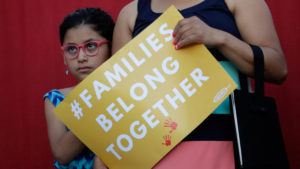 This so-called “zero-tolerance” approach creates immediate and lasting harm to the thousands of families forcibly separated at our borders, the effects of which cannot be understated. It also presents a clear and present danger to the fundamental values we uphold as a nation that has historically provided safe harbor for those seeking security, freedom, and the opportunity to create a better life for themselves and their children.
This so-called “zero-tolerance” approach creates immediate and lasting harm to the thousands of families forcibly separated at our borders, the effects of which cannot be understated. It also presents a clear and present danger to the fundamental values we uphold as a nation that has historically provided safe harbor for those seeking security, freedom, and the opportunity to create a better life for themselves and their children.
As a network of more than 170 foundations across the U.S. and Canada, the Funders’ Network for Smart Growth and Livable Communities (TFN) works in support of efforts to create communities that are sustainable, prosperous, resilient — and above all, equitable and inclusive.
The increased vitriol directed at immigrant communities, as well as migrants seeking refuge at our borders, undermines these important efforts. We have heard disturbing reports from across our network of the chilling effect these inhumane actions and attitudes have already had in further isolating a vulnerable population — including a sharp decline in reports of sexual assaults and other serious crimes against immigrants and refugees because victims are distrustful of local authorities; a hesitancy to evacuate to shelters amid natural disasters because of fears of being turned over to immigration officials; and a general reluctance to participate in civic matters because of fears of engaging with government officials. All of these are signs of how pervasive distrust can erode the fabric of a community.
TFN recognizes the important contributions that immigrants have made and continue to make to the social, economic and cultural vibrancy of our communities. And we state unequivocally that for communities to truly thrive, those communities must fully embrace and engage immigrants — as well as other people who have been historically marginalized because of their race, gender, sexual orientation, religion or cultural background.
TFN joins with dozens of other leaders in philanthropy and philanthropy-serving organizations who have co-signed a statement from Grantmakers Concerned with Immigrants and Refugees denouncing unjust family separation and detention policies. Please take a look at the full statement here, as well as this round-up of responses from philanthropy and other resources for funders.
We encourage our members to continue to speak out against intolerance, stand up for the less fortunate, and ensure that we serve our communities in ways that are compassionate and just.
In solidarity,
Patricia L. Smith, President and CEO, Funders' Network for Smart Growth and Livable Communities
Tom Woiwode, Chair, Funders' Network for Smart Growth and Livable Communities Board of Directors

